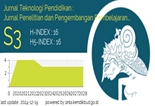Digital Literacy Development Strategy in Higher Education Institutions
Abstract
Keywords
Full Text:
PDFReferences
Aviram, A., & Eshet-Alkalai, Y. (2006). Digital literacy: A new terminology framework. The International Review of Research in Open and Distributed Learning, 7(1), 1-18.
Bawden, D., & Robinson, L. (2012). Introduction to Information Science. Facet Publishing.
Fraillon, J., Schulz, W., & Ainley, J. (2019). Preparing for Life in a Digital World: IEA International Computer and Information Literacy Study 2018 International Report. Springer.
Eshet-Alkalai, Y. (2004). Digital literacy: A conceptual framework for survival skills in the digital era. Journal of Educational Multimedia and Hypermedia, 13(1), 93-106.
Hobbs, R. (2010). Digital and Media Literacy: A Plan of Action. The Aspen Institute.
Hsieh, Y. J., Cho, S. H., & Huang, Y. M. (2018). From Information Literacy to Digital Information Literacy: Moving Beyond the Basics. Computers in Human Behavior, 89, 23-29.
Jenkins, H. (2006). Convergence Culture: Where Old and New Media Collide. New York University Press.
Johnson, L., Adams Becker, S., & Estrada, V. (2020). The NMC Horizon Report: 2020 Higher Education Edition. New Media Consortium.
Kellner, D. (2002). Technological Transformation, Multiple Literacies, and the Restructuring of Education. In M. Warschauer & R. Kern (Eds.), Networked-Based Language Teaching: Concepts and Practice (pp. 29-66). Cambridge University Press.
Kementerian Pendidikan dan Kebudayaan. (2017). Materi Pendukung Literasi Digital. Jakarta: Kemdikbud.
Lankshear, C., & Knobel, M. (2008). Digital Literacies: Concepts, Policies and Practices. Peter Lang.
Lee, M., & McRae, N. (2018). The role of digital literacy in higher education: A framework for teaching and learning. Higher Education, 75(2), 289-304.
Livingstone, S. (2008). Taking Risky Opportunities in Youthful Content Creation: Teenagers' Use of Social Networking Sites for Intimacy, Privacy and Self-Expression. New Media & Society, 10(3), 393-411.
Livingstone, S. (2012). Critical Reflections on the Benefits of ICT in Education. Oxford Review of Education, 38(1), 9-24.
Livingstone, S., & Bulger, M. (2013). A Global Agenda for Children’s Rights in the Digital Age. Journal of Children and Media, 7(3), 317-335.
Martin, A., & Grudziecki, J. (2006). DigEuLit: Concepts and Tools for Digital Literacy Development. Innovate: Journal of Online Education, 3(4), Article 3.
Moser, K. (2019). Digital literacy as a key competence for the 21st century. Journal of Educational Technology & Society, 22(2), 38-48.
Raths, D., Liang, J., & Cao, Y. (2017). Effects of Digital Literacy Instruction on Pre-service Teachers: A Longitudinal Investigation. Teaching and Teacher Education, 63, 319-327.
UNESCO. (2013). The UNESCO ICT Competency Framework for Teachers. United Nations Educational, Scientific and Cultural Organization (UNESCO).
Warschauer, M. (2007). The Paradoxical Future of Digital Learning. Learning Inquiry, 1(1), 41-49.
Yuen, A. H. K., Cheng, R. W. Y., & Zhang, W. (2017). Digital literacy and learning in higher education: Exploring the impact of digital tools on students' academic development. Journal of Educational Computing Research, 55(8), 1121-1138.
DOI: https://doi.org/10.33394/jtp.v10i1.13882
Refbacks
- There are currently no refbacks.
Copyright (c) 2025 Agus Jayadi, Hastuti Diah Ikawati, Abdurrahman Abdurrahman, M. Ary Irawan,

This work is licensed under a Creative Commons Attribution-ShareAlike 4.0 International License.
This Journal has been Indexed by:
Jurnal Teknologi Pendidikan
ISSN: 2656-1417 (Online)
ISSN: 2503-0620 (Print)
Published by Program Studi Teknologi Pendidikan, FIPP
Universitas Pendidikan Mandalika
Email: [email protected]

This work is licensed under a Creative Commons Attribution-ShareAlike 4.0 International License.















.png)






